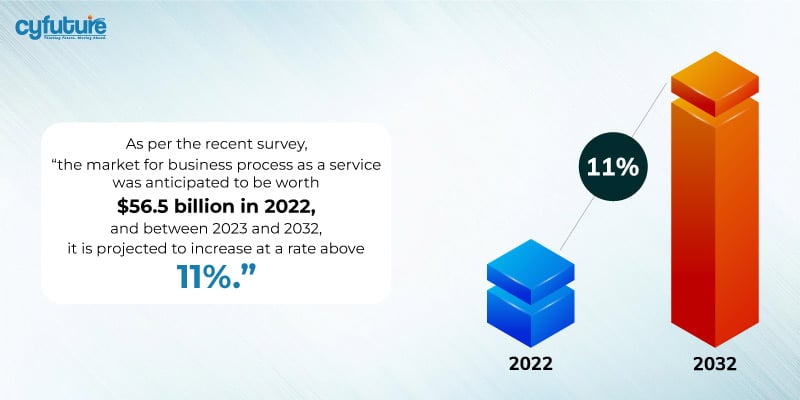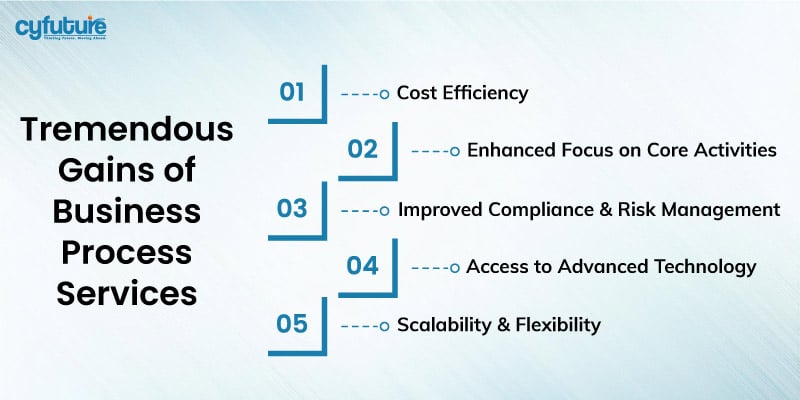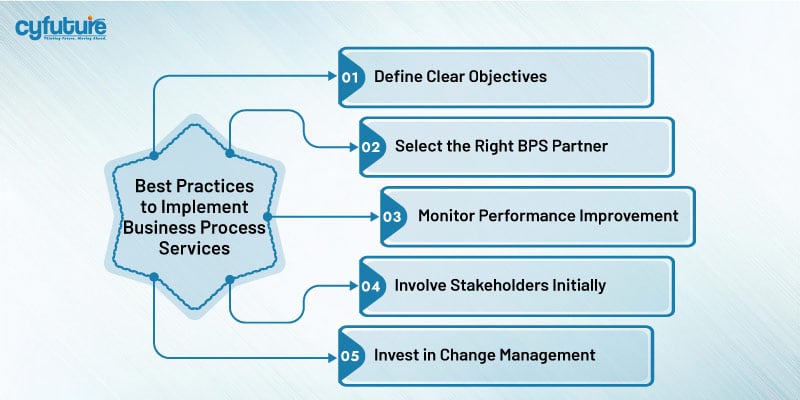-
Get Cloud GPU Server - Register Now!
Toggle navigation

Businesses face an overload of tasks, data, and procedures in today’s digital environment, which can lead to monotonous and ineffective processes. Moreover, it is possible that the agility and responsiveness required to maintain competitiveness. It will no longer be possible to regulate these operations through traditional methods.
This is because operational excellence is not merely a goal; it’s very necessary. By improving every facet of its operations, your company may gain the competitive edge it seeks. Aside from that, Business Process Services (BPS) could act as a spur to that change.
Business Process Services are a revolutionary approach to enhancing operational processes that leverage cloud computing and all-inclusive cloud security services. By being aware of the components of BPS and how to customize it to meet your specific requirements, you may create new opportunities for productivity and effectiveness.
Would you be willing to switch to a more streamlined, productive, and efficient way of doing business? Should that be the case, our analysis of Business Process Services will clarify how it might help your company achieve operational excellence.
This blog will examine business process services in detail, as well as their significance in achieving operational excellence. Additionally, we’ll cover key topics such as how Business Process Services may improve operational efficiency, the benefits of using cloud computing, and the need to uphold robust cloud security. By the end, you’ll understand exactly how to apply Business Process Services to advance your company.

Now, let’s delve into the deep knowledge pool!
Business Process Services range across a wide spectrum of outsourced services, which can help streamline the general functions of any organization. Services offered under these will include everything from customer service and IT support to human resources and even financial management. Businesses could focus on their core competencies while still gaining improved efficiency and low operational costs due to such outsourcing of their respective functions to specialized providers.

Reduced Costs are one of the many benefits that BPS can offer. Outsourcing non-core activities has the strong potential to reduce labor costs, overhead expenses, and capital expenditures. This frees up a company’s resources to invest elsewhere for better growth.
Businesses become focused on core competencies because routine activities are outsourced to Business Process Services providers. That gives those firms a much greater strategic ability to innovate, offer more products, enhance customer experience, and, therefore, derive sustained competitive advantage.
The BPS service provider keeps updated with the latest technologies, i.e., automation, artificial intelligence, and analytics, to maintain its technological edge. Thus, organizations get access to such advanced tools and solutions without having to construct large reservoirs of upfront investment from within the organization. However, they also obtain support for new business development.
Business Process Services provides the flexibility to scale operations up or down to meet business needs. This agility really comes in very handy in today’s volatile market conditions, enabling businesses to change direction quickly to respond to new demands and opportunities.
Most industries face the challenge of regulatory compliance. BPS providers have the expertise and infrastructure in place to ensure compliance with pertinent regulations, thereby reducing risks of costly fines and reputation management.
Cloud integration with Business Process Services will further enhance operational excellence. Cloud Server solutions provide the much-needed infrastructure for improved data management and process automation. How cloud technologies can amplify the benefits of Business Process Services:
Cloud Servers make sure that any data or application is readily accessible and reachable from anywhere to facilitate working teams together. Access means giving workers the capability to achieve efficiency, either at the office desk or through workstations; hence, the improvement in productivity transcends all.
Cloud security services keep sensitive data secure. A Business Process Services provider boasts the most robust security measures- encryption and access controls to ensure the protection of businesses’ information. Strengthening this security reduces the risks and keeps the compliance standards of the industry.
The cloud provides organizations with analytics on data solutions that produce real-time views into the performance of operations. By using these views, a business entity is at liberty to make informed decisions, identify areas of improvement, and continue improving the processes to increase effectiveness.
Cloud technology enables BPS implementations on the part of an organization by providing easy scalability in operations. Cloud services can be easily deployed at short notice, and this deployment will allow a business to adopt flexible responses to changing business operating requirements without significant delays.
Cloud technology helps to decrease infrastructural costs associated with the management of business processes. Organizations may benefit from the ‘pay-as-you-go’ model, which would minimize upfront investments.

To gain the best possible outcomes of BPS, organizations must strategically approach the implementation process. Here are some best practices that will be considered here.
Any organization must first define clear objectives and results they expect to achieve prior to initiating BPS implementation. This will make the decision-making on the services being selected in alignment with other business objectives.
One of the most significant things is choosing a valid Business Process Services provider. An organization would have to evaluate prospective partners concerning relevant experience, technological capabilities, and reported performance records. Actually, a fine partnership is always a fiercely critical determinant of the success or failure of a BPS initiative.
Involving key stakeholders from different departments during the implementation planning stage is necessary for BPS to be successful. The effectiveness of business process services can only be guaranteed if the perspectives of various stakeholders are taken into account.
Organizations need to set performance metrics post-BPS implementation. It will help monitor continuous progress and outcomes. The constant review and feedback loop will be there to ensure that efficiency and effectiveness are achieved and maintained in the processes over time.
Change can be hurtful to employees. Therefore, change management strategies must be invested in by organizations to make the transition of Business Process Services as smooth as possible. Training and support can ease the transition and change of employees in adopting new processes and new technology.
As technology continues to advance, the landscape of Business Process Services is evolving rapidly. Here are some trends shaping the future of BPS:
The integration of artificial intelligence (AI) and robotic process automation (RPA) is transforming BPS. These technologies enable organizations to automate repetitive tasks, reduce human error, and enhance overall efficiency.
Organizations are increasingly recognizing the importance of customer experience. Business Process Services providers are enhancing service delivery models to ensure that customer interactions are seamless, personalized, and efficient.
The ability to leverage data analytics for informed decision-making is becoming a cornerstone of BPS. Organizations will increasingly rely on real-time data insights to optimize processes and drive performance.
The shift to cloud-based solutions will continue to grow as organizations seek the flexibility and scalability offered by cloud technologies. Business Process Services providers will increasingly adopt cloud solutions to enhance their service offerings.
With the rise in cyber threats, BPS providers will prioritize cybersecurity measures. Organizations must ensure that their Business Process Services partners implement robust security protocols to safeguard sensitive data.
The way to operational excellence is far from easy, requiring a strategic approach and appropriate tooling. Business Process Services (BPS) enable a business to streamline its operations, reduce costs, and enhance efficiency. Organizations can outsource non-core functions to specialized providers, allowing them to concentrate more on their core competencies and drive innovation, moving forward in operations.
Using cloud technologies in BPS also benefits business processes with increased data accessibility, immediate analytics, and elasticity. These technologies enable a business to respond promptly to market fluctuations and optimize the usage of resources. Balancing cloud security is important to ensure the protection of sensitive information. Also, industry standards are adhered to maintain the integrity and trustworthiness of operations.
Consider the best practices mentioned in this blog to get maximum benefits from your BPS implementation as you embark on this journey. Define clear objectives for how you want your BPS initiatives to be aligned with your business goals. Choose the right Business Process Services partners who have a track record and knowledge of your industry. Monitor performance metrics regularly and hold reviews frequently to pinpoint opportunities for growth as well as changes in needs.
With the right approach and tools, Business Process Services can help truly transform your operations for sustainable success. The net outcome can be operational excellence for your organization if the practices are adopted.
BPS service providers apply specialists’ expertise, technologies, and processes to increase efficiency. Through the relocation of non-core business activities, your organization will benefit from optimized workflows, an increased efficiency turnaround, and the elimination of operational bottlenecks, thereby realizing huge productivity gains.
Yes, outsourcing business processes significantly save costs. Business Process Services providers work under economies of scale. Hence, their charges will be lower compared to those of an in-house team. It also saves a company from heavy investments in infrastructure, technology, and training- this also contributes toward cost savings and operations.
Indeed. Properly credible Business Process Services providers have strict quality standards and always adopt best practices in order to ensure a high level of service. They employ the services of competent professionals with superior quality control measures, ensuring you receive exceptional quality results for your enterprise to continue with or improve its quality standards.
BPS is very suitable for SMEs because it offers world-class capabilities and resources through highly non-capital-intensive investments. In general, SMEs can ‘outsource’ functions for which they don’t have core competencies, focus on growth and innovation, and, of course, enjoy the efficiency and cost savings created by Business Process Services.
Industry expertise, technological capabilities, service offerings, and how competent they have proved to be in delivering the service are key attributes when selecting a BPS provider. Assess if they can align with your business direction; evaluate their quality assurance process, approach to security and compliance, and so on. Carry out the due diligence process seriously to arrive at the best provider for your needs.